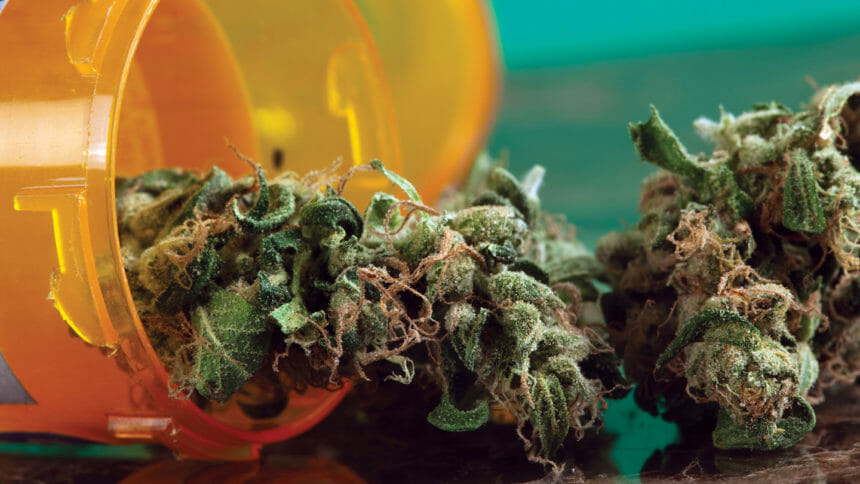
Seniors increasingly are using cannabidiol, or CBD, to help manage a variety of chronic disease symptoms — despite a lack of high-quality clinical research on the drug, according to the Gerontological Society of America. A new paper presents key questions about CBD safety and side effects in older adults, and what information clinicians will need to answer patients’ questions about the drug.
The GSA paper, “Medical Use of Cannabidiol (CBD) in Older Adults: A Focused Discussion on Safety,” summarizes a 2020 meeting of experts in pharmacy, clinical medicine and research, law and policy.
CBD is an active ingredient of cannabis, or marijuana, and an essential component of medical marijuana. There is a perception that the growing variety of health products containing CBD are low-risk for side effects, and a need exists for more clinical guidance, panelists said.
“Despite the scarcity of evidence, older adults are interested in using, or are already using, CBD products to alleviate symptoms from numerous diseases, undeterred by the risks. Thus, it is urgent to address current gaps in knowledge about the safety of CBD products in older adults through scientifically rigorous research,” the authors wrote.
Clinicians now face questions such as what ingredients are contained in CBD products, what effects can be expected, and whether CBD products interact with prescription or over-the-counter medications.
“It remains unclear what evidence supports their use for common chronic conditions such as pain, insomnia, loss of appetite, depression, anxiety, and weight loss,” the authors wrote. There is also the overarching question of what role healthcare providers should play in counseling patients who may perceive CBD to be outside of the clinician’s realm.
Those concerns become more pronounced in the context of the human aging process, they added.
One sign of possible safety concerns related to non-Food and Drug Administration-approved CBD products has been a sharp rise in calls to poison control centers between 2014 and 2020, according to William J. Lynch Jr., BPharm, RPh, of Jefferson Health and Rowan University School of Osteopathic Medicine, in New Jersey.
Seniors not immune to adverse effects
It is known that CBD consumed as an ingredient in a non-FDA-approved medical product can produce acute impairment of attention, memory, verbal learning, executive function and psychomotor function, the GSA said. But exactly how aging-related changes in physiology affect the responses of older adults is yet unknown, it added.
Adverse reactions seniors may face when using non-FDA-approved CBD products include insomnia, diarrhea, fatigue, malaise, rash, vomiting, elevations in the liver enzymes, and infections, Lynch said.
“It’s important to know these effects because as pharmacists and physicians, we might modify a person’s medications if we found elevated liver function tests, for example — especially for older adults,” he said. “There also are many drug interactions with CBD that could cause increased clotting or bleeding, hepatotoxicity, or changes in metabolism that would require doses of other medications to be changed. CBD is not necessarily benign.”
Experts are concerned about a lack of oversight by the FDA and a lack of documentation on potential drug interactions. Inert or nonactive ingredients in non-FDA-approved CBD products (such as sesame seed oil and alcohol) also have the potential to trigger side effects, the GSA authors wrote.
The clinicians’ role
Clinicians have limited data to share with patients about the safety and efficacy of unapproved CBD products for difficult-to-manage conditions, including anxiety or agitation, depression, as well as behavioral symptoms of Alzheimer’s disease, said Brent Forester, M.D., MSc, chief of the Division of Geriatric Psychiatry at McLean Hospital in Massachusetts and co-president of the American Association for Geriatric Psychiatry.
The current regulatory environment, in which cannabis and most derivative products are treated as Schedule I controlled substances, is a barrier to needed research in these areas, Forester said.
The FDA is seeking to address several topics of interest to the public, according to April Inyard Alexandrow, Ph.D., lead for the agency’s Cannabidiol Policy Working Group. These include:
- What happens if people use CBD daily for sustained periods of time?
- What level of intake triggers the known risks associated with CBD?
- How do different methods of exposure affect intake (for example, oral consumption, topical use, smoking, vaping)?
Most of the GSA meeting participants agreed that CBD science trails well behind policy and product marketing. More data should be collected on the clinical reasons older patients are motivated to use CBD and impediments to proper research should be lifted, they agreed.
“Participants felt that there was a need to build out evidence about the safety profile and efficacy of CBD as it relates to pain, anxiety, insomnia, Parkinson’s disease, dementia, and other conditions for which CBD is considered a potential therapeutic for unmet needs,” they wrote.
Despite limited clinical training on CBD, it is important to support care teams in counseling older patients through the development of new educational opportunities and clinical tools for delivering reliable information, the authors concluded.
The paper is available online.



